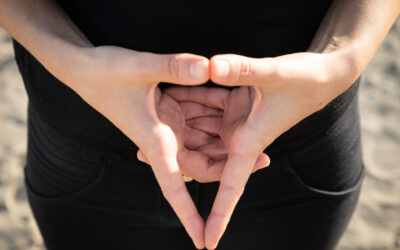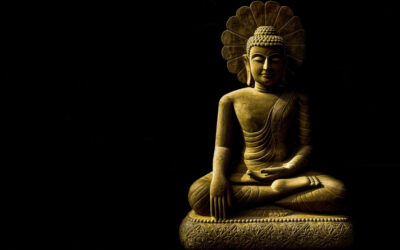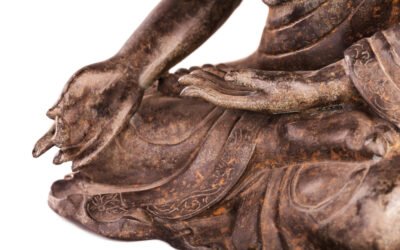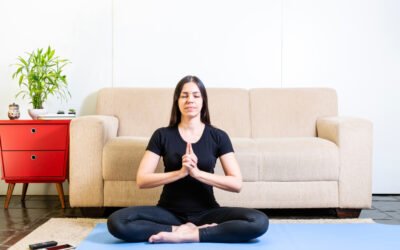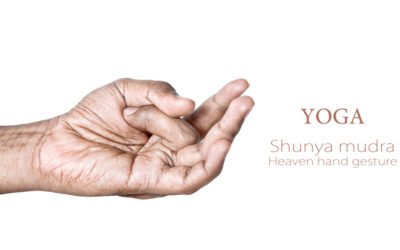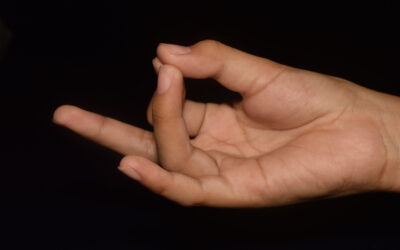The Ganesha Mudra is a symbolic hand gesture commonly used in yoga & meditation practices. Derived from Hindu mythology, this mudra is believed to invoke the energy and qualities of Lord Ganesha, the deity known for his wisdom, intellect & ability to remove obstacles. The Ganesha Mudra holds various benefits for the mind, body & spirit, making it a popular choice for practitioners seeking balance and empowerment. In this article, we will explore the benefits of the Ganesha Mudra, any potential side effects, how to perform it correctly & the precautions to consider before incorporating it into your practice. Whether you are a seasoned yogi or a beginner, understanding the Ganesha Mudra can enhance your spiritual journey and help you harness your inner strength.
Benefits of Ganesha mudra.
This mudra is believed to offer numerous benefits to both the body and mind. Some of the key benefits of Ganesha mudra include:
1. Increased Confidence.
Ganesha mudra is said to stimulate the root chakra, which is associated with feelings of stability, security & self confidence. By practicing this mudra, individuals may experience an enhanced sense of self assurance and the ability to face challenges with greater courage.
2. Improved Focus.
This mudra involves joining the tips of the index & middle fingers with the thumb, while the ring and little fingers remain extended. The pressure created by this hand gesture is believed to activate certain nerve endings in the fingers, which can help to improve concentration & mental clarity.
3. Overcoming Obstacles.
Ganesha, the Hindu deity associated with this mudra is known as the remover of obstacles. Practicing Ganesha mudra is believed to invoke his energy & aid in overcoming obstacles and challenges in life. It can provide individuals with the strength & determination to overcome any hurdles they may face.
4. Increased Energy Flow.
The specific finger positioning in Ganesha mudra is believed to create a flow of energy within the body. This energy flow can help to remove any blockages or stagnation, resulting in increased vitality and a sense of rejuvenation.
5. Balancing Emotions.
Ganesha mudra is thought to have a calming effect on the mind & emotions. By practicing this mudra, individuals may experience a reduction in feelings of anger, frustration & anxiety. Instead, they may cultivate a sense of peace, balance & emotional stability.
6. Strengthening of Hands & Arms.
Regular practice of Ganesha mudra can help to strengthen the muscles in the hands & arms. This can be particularly beneficial for individuals who engage in activities that require grip strength like yoga, weightlifting or manual labor.
7. Connection to Spirituality.

Ganesha mudra is often used as a way to connect with one’s spiritual self. By assuming this hand gesture during meditation or prayer, individuals can deepen their connection to their inner self & cultivate a sense of spiritual awareness.
8. Ganesha mudra for shoulder pain.
This mudra helps to open and stretch the chest & shoulder area, relieving tension & stiffness. It also activates the energy flow in the arms and shoulders, promoting healing and reducing pain. With regular practice, the Ganesha mudra can provide relief from shoulder pain & improve overall flexibility and mobility in the upper body.
| 💡 Tips FreakToFit.com Incorporating Ganesha mudra into one’s yoga or meditation practice can offer a wide range of benefits for both the body and mind. Whether seeking physical strength, emotional balance, or spiritual connection, this mudra serves as a powerful tool for personal growth and self-transformation. |
Side Effects of Ganesha mudra.
Like any other practice, it is important to be aware of potential side effects that may occur when practicing this mudra. While these side effects are generally rare & mild, it is vital to understand them to ensure a safe and beneficial practice:
1. Muscle Discomfort.
One possible side effect of Ganesha mudra is mild muscle discomfort or strain. This can occur if the practitioner is not properly aligned or if they are holding the mudra with excessive force.
It is important to listen to the body and adjust the hand position and pressure accordingly to prevent any discomfort or strain.
2. Fatigue.
Some individuals may experience mild fatigue after practicing Ganesha mudra for an extended period. This can be due to the energy flow & stimulation happening within the body during the practice. It is advisable to take breaks and rest when needed to prevent excessive fatigue.
3. Emotional Release.
Ganesha mudra is known to stimulate energy flow & release emotional blocks. As a result, some individuals may experience an emotional release during or after practicing this mudra.
This can manifest as sudden mood swings, feelings of sadness or even tears. It is important to embrace and allow these emotions to surface, understanding that they are part of the healing process.
4. Increased Energy.
Ganesha mudra can bring about an increase in energy levels. While this is generally considered a positive effect, some individuals may find it overwhelming if they are not accustomed to high energy states.
It is important to integrate this increased energy gradually & practice grounding techniques to maintain balance.
5. Heightened Sensitivity.
Ganesha mudra can enhance one’s sensitivity to both physical & emotional stimuli. This can be beneficial for deepening awareness and intuition; however, it may also make individuals more susceptible to external influences.
It is important to create a safe & supportive environment when practicing this mudra to prevent overwhelm or negative effects.
6. Spiritual Awakening.
Ganesha mudra is known to activate the energy centers & facilitate spiritual growth. As a result, individuals may experience a heightened sense of spirituality or a deepening of their spiritual practice.
While this can be a transformative & positive effect, it is important to approach any spiritual awakening with patience, self care & guidance if needed.
| 💡 Tips FreakToFit.com It is worth noting that these side effects are not experienced by everyone & for most individuals, practicing Ganesha mudra will simply result in the numerous benefits associated with it. However, being aware of these potential side effects allows practitioners to approach the practice with mindfulness and adapt it to their unique needs & experiences. |
How To Do Ganesha Mudra?
If you are interested in incorporating Ganesha mudra into your practice, follow these steps:
1. Find a comfortable seated position.
Begin by finding a comfortable seated position on a yoga mat or cushion. You can choose to sit cross legged on the floor or use a meditation pillow or bolster to support your hips & spine. Ensure that your back is straight, your shoulders are relaxed & your chest is open.
2. Relax your hands.
Take a few moments to relax your hands and let go of any tension or tightness. Allow your palms to rest on your thighs, facing upwards or downwards, whichever feels more comfortable for you.
3. Form the Ganesha mudra with your right hand.
Raise your right hand in front of your chest with your palm facing towards you. Bend your fingers inward, curling them towards your palm. The tips of your fingers should be touching the base of your thumb.
4. Form the Ganesha mudra with your left hand.
Now, bring your left hand in front of your chest, palm facing away from you. Place your left palm on top of your right hand, with your fingers interlacing. The thumb of your left hand should be resting on top of the thumb of your right hand.
5. Relax & breathe.
Once you have formed the mudra, take a moment to relax your whole body & focus on your breath. Close your eyes if it feels comfortable for you.
Take deep, slow breaths, inhaling & exhaling through your nose. Allow your breath to flow naturally and calmly.
6. Set your intention.
While holding the Ganesha mudra, take a moment to set your intention for your practice. It could be to overcome a specific obstacle, cultivate wisdom or simply find clarity & focus in your life. Visualize this intention and feel the energy of Ganesha supporting and guiding you.
7. Maintain the mudra for a few minutes.
Hold the Ganesha mudra for a few minutes, allowing the energy to flow through your hands & into your body. You may choose to repeat a mantra or affirmation silently or out loud, such as “Om Gan Ganapataye Namaha” which is a powerful mantra for invoking Lord Ganesha’s blessings.
8. Release the mudra.
When you are ready to release the mudra, gently unclasp your fingers & bring your hands back to your thighs. Take a moment to observe any sensations or shifts in your body and mind.
| 💡 Tips FreakToFit.com Incorporating Ganesha mudra into your regular yoga or meditation practice can help you to connect with the energy of Ganesha, enhance your focus & remove any obstacles that may be hindering your growth and progress. Regular practice and dedication will deepen your experience and bring about positive changes in your life. |
Precautions during Ganesha mudra.
During the practice of Ganesha mudra, it is important to take certain precautions to ensure a safe & effective experience. Here are some precautions to keep in mind:
1. Warm up.
Prior to starting the Ganesha mudra, it is advisable to warm up your body with some gentle stretching exercises. This helps to prepare the muscles & joints for the practice and reduces the risk of injury.
2. Proper posture.
Sit in a comfortable and stable position like cross legged on the floor or on a chair with a straight back. Ensure that your spine is aligned and your shoulders are relaxed. Maintaining proper posture during the practice helps to promote an uninterrupted flow of energy.
3. Gradual progression.
Begin with holding the Ganesha mudra for a short duration & gradually increase the time as your body becomes more accustomed to the practice. Avoid pushing yourself too hard and listen to your body’s signals to avoid strain or discomfort.
4. Breath awareness.
Remain mindful of your breath throughout the practice. Breathe deeply & naturally, without forcing or straining. This helps to enhance the flow of energy & promote a sense of calmness.
5. Gentle pressure.
While performing the mudra, apply gentle pressure between your palms, fingertips & knuckles. Avoid excessive force or strain, as this can lead to discomfort or injury. Find the right level of pressure that feels comfortable for you.
6. Awareness of limitations.
Each individual’s body is unique, so it is essential to be aware of your own limitations. If you experience any pain, discomfort or dizziness during the practice, gently release the mudra & take a break. Consult a qualified yoga instructor or healthcare professional if needed.
7. Hydration.
Stay hydrated before, during & after the practice. Drinking enough water helps to keep your body well functioning & supports the elimination of toxins.
8. Regular practice.
To experience the full benefits of Ganesha mudra, it is recommended to practice it regularly. Consistency is key in developing strength, flexibility & a deeper connection to the mudra’s energetic qualities.
| 💡 Tips FreakToFit.com By following these precautions, you can ensure a safe & effective practice of Ganesha mudra, allowing you to fully experience its benefits for physical, mental and spiritual wellbeing. |
My personal experiences on Ganesha Mudra.
Ganesha Mudra is a powerful hand gesture that I have incorporated into my personal yoga and meditation practice. This mudra involves interlacing the fingers, with one thumb pointing up and the other thumb pointing down.
Whenever I perform Ganesha Mudra, I feel an immediate sense of grounding and stability. It helps me to connect with my inner strength and power, allowing me to release any negative emotions or obstacles that might be hindering my personal growth.
This mudra has become a symbol of overcoming challenges and finding the courage to face life’s struggles head on.
It has not only provided me with a physical sense of balance but has also served as a reminder to approach life with confidence and determination.
Overall, my personal experiences with Ganesha Mudra have been transformative, helping me to cultivate resilience and embrace the journey of self discovery.
Frequently Asked Question.
Ganesha Mudra can be practiced anytime but it is particularly helpful when facing challenges, feeling stuck or seeking inspiration & motivation. It can be incorporated into meditation, yoga asanas or simply practiced in a seated or standing position.
Yes, Ganesha Mudra can be combined with other mudras or incorporated into a mudra sequence for specific purposes. For example, combining it with Anjali Mudra (prayer pose) can intensify the heart-opening and devotional aspects of the practice.
There is no strict time limit for holding Ganesha Mudra. It can be held for a few breaths or for an extended duration, depending on your comfort & the intention of your practice. Experiment with different durations and listen to your body to find what works best for you.
Yes, Ganesha Mudra is suitable for beginners. It is a relatively simple mudra that can be easily learned and incorporated into a yoga or meditation practice.
However, it is always recommended to practice under the guidance of a qualified instructor, especially if you are new to yoga or have any specific concerns or limitations.
Bottom Line.
The Ganesha Mudra is a powerful and transformative hand gesture that holds significant meaning in the practice of yoga and meditation. By forming this mudra, we can tap into the energy and qualities of Lord Ganesha, the remover of obstacles & invite his blessings into our lives. The Ganesha Mudra helps to cultivate confidence, courage & determination, enabling us to overcome challenges & blockages on our spiritual journey. Its simplicity makes it accessible to practitioners of all levels and its benefits extend beyond the physical realm, reaching into the realm of the mind & spirit. Incorporating the Ganesha Mudra into our practice can bring about a deep sense of empowerment, resilience & inner strength, allowing us to navigate life’s obstacles with grace and ease.

 Workout
Workout
 Meditation
Meditation


 Stories
Stories


 Podcast
Podcast E-book
E-book

